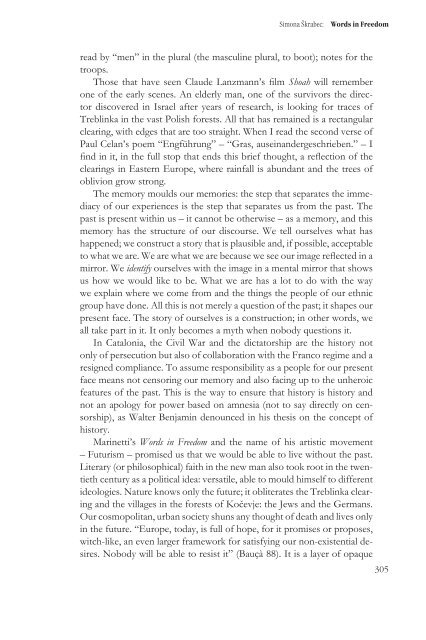Literatura in cenzura - Društvo za primerjalno književnost - ZRC SAZU
Literatura in cenzura - Društvo za primerjalno književnost - ZRC SAZU
Literatura in cenzura - Društvo za primerjalno književnost - ZRC SAZU
- No tags were found...
Create successful ePaper yourself
Turn your PDF publications into a flip-book with our unique Google optimized e-Paper software.
Simona Škrabec:Words <strong>in</strong> Freedomread by “men” <strong>in</strong> the plural (the mascul<strong>in</strong>e plural, to boot); notes for thetroops.Those that have seen Claude Lanzmann’s film Shoah will rememberone of the early scenes. An elderly man, one of the survivors the directordiscovered <strong>in</strong> Israel after years of research, is look<strong>in</strong>g for traces ofTrebl<strong>in</strong>ka <strong>in</strong> the vast Polish forests. All that has rema<strong>in</strong>ed is a rectangularclear<strong>in</strong>g, with edges that are too straight. When I read the second verse ofPaul Celan’s poem “Engführung” – “Gras, ause<strong>in</strong>andergeschrieben.” – If<strong>in</strong>d <strong>in</strong> it, <strong>in</strong> the full stop that ends this brief thought, a reflection of theclear<strong>in</strong>gs <strong>in</strong> Eastern Europe, where ra<strong>in</strong>fall is abundant and the trees ofoblivion grow strong.The memory moulds our memories: the step that separates the immediacyof our experiences is the step that separates us from the past. Thepast is present with<strong>in</strong> us – it cannot be otherwise – as a memory, and thismemory has the structure of our discourse. We tell ourselves what hashappened; we construct a story that is plausible and, if possible, acceptableto what we are. We are what we are because we see our image reflected <strong>in</strong> amirror. We identify ourselves with the image <strong>in</strong> a mental mirror that showsus how we would like to be. What we are has a lot to do with the waywe expla<strong>in</strong> where we come from and the th<strong>in</strong>gs the people of our ethnicgroup have done. All this is not merely a question of the past; it shapes ourpresent face. The story of ourselves is a construction; <strong>in</strong> other words, weall take part <strong>in</strong> it. It only becomes a myth when nobody questions it.In Catalonia, the Civil War and the dictatorship are the history notonly of persecution but also of collaboration with the Franco regime and aresigned compliance. To assume responsibility as a people for our presentface means not censor<strong>in</strong>g our memory and also fac<strong>in</strong>g up to the unheroicfeatures of the past. This is the way to ensure that history is history andnot an apology for power based on amnesia (not to say directly on censorship),as Walter Benjam<strong>in</strong> denounced <strong>in</strong> his thesis on the concept ofhistory.Mar<strong>in</strong>etti’s Words <strong>in</strong> Freedom and the name of his artistic movement– Futurism – promised us that we would be able to live without the past.Literary (or philosophical) faith <strong>in</strong> the new man also took root <strong>in</strong> the twentiethcentury as a political idea: versatile, able to mould himself to differentideologies. Nature knows only the future; it obliterates the Trebl<strong>in</strong>ka clear<strong>in</strong>gand the villages <strong>in</strong> the forests of Kočevje: the Jews and the Germans.Our cosmopolitan, urban society shuns any thought of death and lives only<strong>in</strong> the future. “Europe, today, is full of hope, for it promises or proposes,witch-like, an even larger framework for satisfy<strong>in</strong>g our non-existential desires.Nobody will be able to resist it” (Bauçà 88). It is a layer of opaque305
















